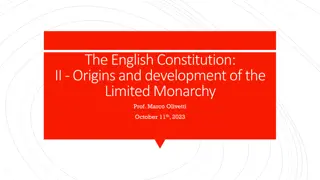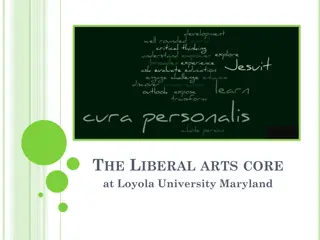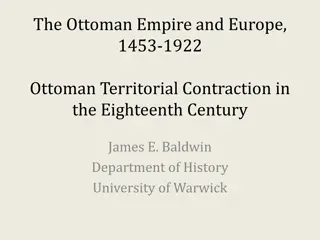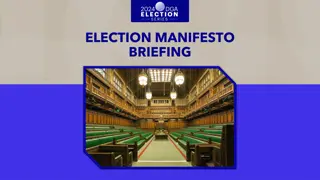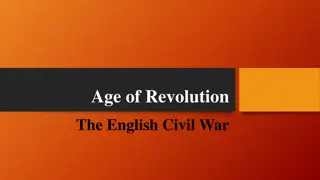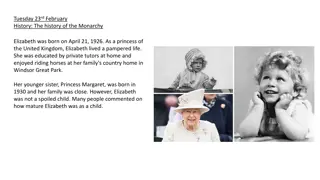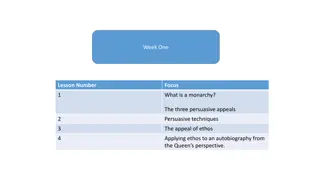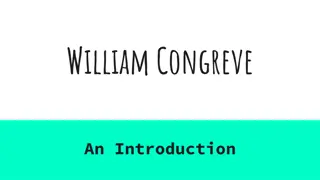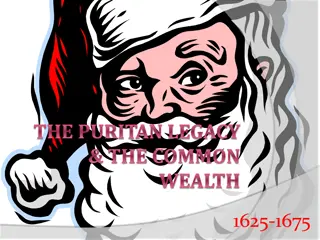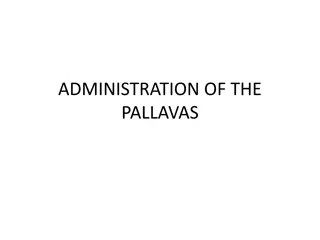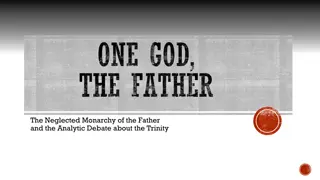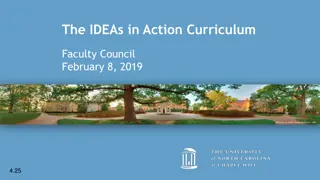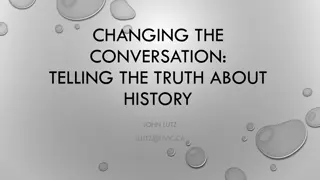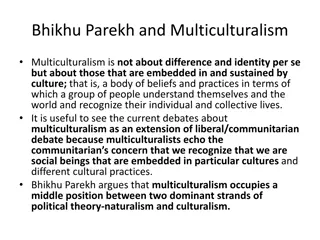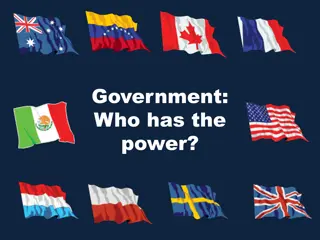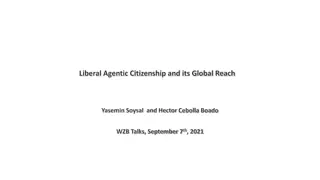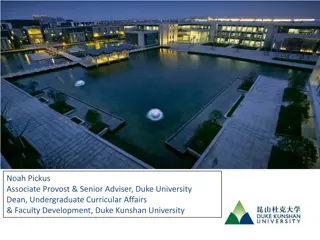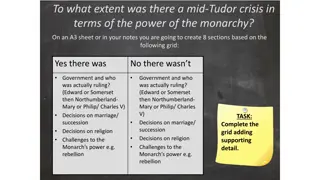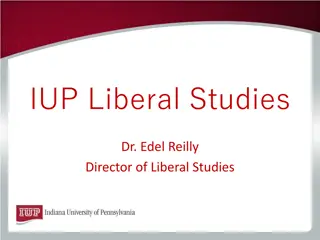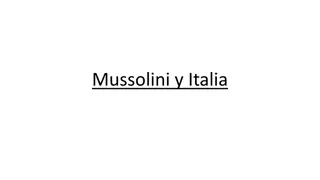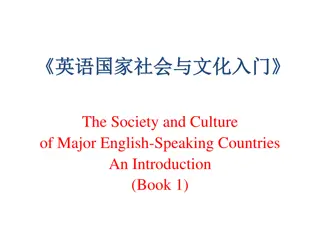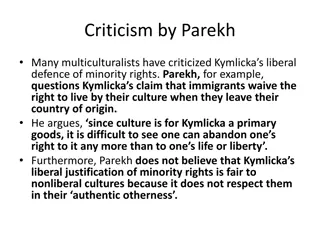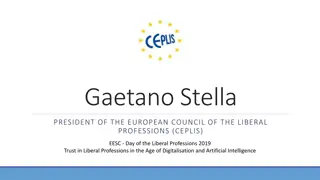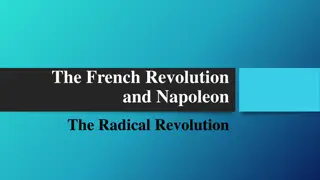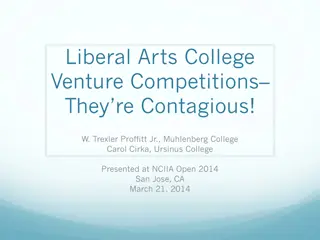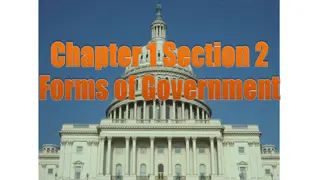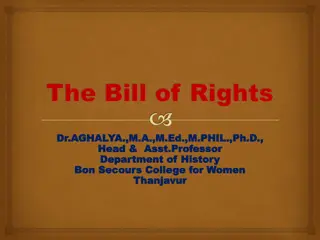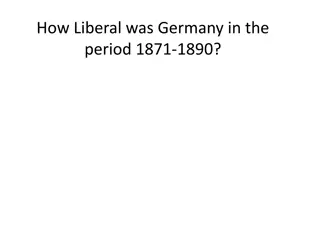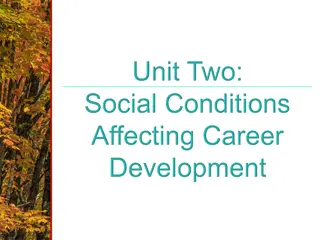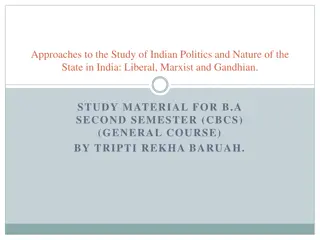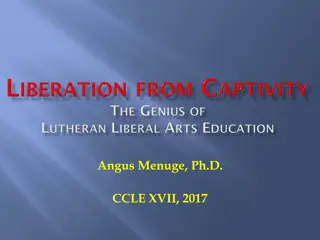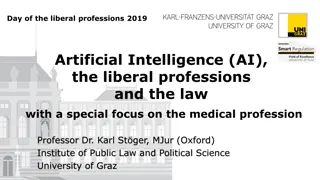Cromwell in Ireland
English authority in Ireland faced challenges after the rebellion of 1641. Cromwell was appointed to crush unrest, landing near Dublin with 12,000 men. Concerns of Parliament included the threat of Catholicism and the use of Ireland against the monarchy. Criticisms arose over Cromwell's brutal campa
0 views • 13 slides
Evolution of Limited Monarchy in English Constitution
The development of limited monarchy in the English Constitution is traced from Anglo-Saxon Britain through the introduction of feudalism. This system of governance established a complex relationship between the king, lords, and vassals, leading to the formation of the King's Council and the origins
0 views • 19 slides
Loyola University Maryland Liberal Arts Core Overview
The Liberal Arts Core at Loyola University Maryland emphasizes a well-rounded education through courses in Humanities, Social Sciences, Mathematical Sciences, and Natural Sciences. Students take 15 core courses in liberal arts, including writing, history, literature, language, philosophy, theology,
2 views • 19 slides
Ottoman Empire Territorial Contraction in the 18th Century
Ottoman Empire faced agricultural and fiscal crises in the 17th century, leading to internal rebellions. However, by the mid-17th century, the empire had recovered and experienced further expansion, albeit at a slower rate compared to the previous century. In the 18th century, the Ottomans suffered
2 views • 12 slides
Election Manifesto Briefing: Key Takeaways on Tax, Finance, and Crime Policies
Labour, Liberal Democrats, and Conservatives present contrasting plans on tax, finance, and crime policies in their election manifestos. From scrapping business rates to increasing workers' rights and tackling crime, each party has distinct priorities and proposals. The Liberal Democrats focus on ta
0 views • 10 slides
The English Civil War and the Rise of the Stuart Dynasty
The English Civil War marked the end of the Tudor dynasty and the rise of the Stuart Dynasty in England. It was a time of conflict between the monarchy and Parliament, with issues revolving around divine right, religion, and political power. Leaders like James I and Charles I faced opposition from P
0 views • 13 slides
The Fascinating History of Queen Elizabeth II and the British Monarchy
Princess Elizabeth's journey from a pampered princess to a mature and resilient queen, overcoming challenges during World War II and ultimately becoming the longest-reigning British monarch in history, with significant events like her marriage to Prince Philip and her coronation in 1953 highlighted.
2 views • 5 slides
Understanding Monarchy: A Study in Persuasive Appeals
Introduction to the concept of monarchy as a form of government and its various manifestations, exploring persuasive appeals and the application of ethos through the perspective of a queen. The content delves into the role of a monarchy in modern society and encourages critical analysis through tran
10 views • 18 slides
The Influence of William Congreve on Restoration Comedy
William Congreve, an English playwright and poet of the Restoration period, is known for his clever and satirical dialogue that influenced the comedy of manners style. The Restoration period marked the end of Cromwell's Commonwealth and the return of monarchy with Charles II. Comedy of manners refle
0 views • 10 slides
Evolution of Citizenship in Liberal Democracy
Citizenship within liberal democracy entails equal rights, duties, liberties, and constraints for individuals within a political community. The entrenchment of civil and political rights has shaped the struggle for membership and participation in political communities. Civil rights, essential for in
1 views • 11 slides
The Puritan Legacy & The Commonwealth 1625-1675: A Historical Overview
The era between 1625-1675 is known as The Puritan Legacy & The Commonwealth, characterized by a Puritan movement seeking moral and political reform. This period saw conflict, the rise of Puritan standards, beheading of Charles I, and the establishment of the Commonwealth under Cromwell. The Puritans
2 views • 21 slides
Administration of the Pallavas: Organized Governance in Ancient Tamil Country
The Pallava kings established a well-organized administration in the Tamil Country, mirroring the Mauryan system. Administrative units like Mandalam, Kottam, Nadu, and Ur were pivotal in governing the vast Pallava Empire. The monarchy was led by the king, who claimed divine origin, with efficient Co
0 views • 8 slides
Analyzing the Neglected Monarchy of the Father in Trinitarian Debate
Exploring the Monarchy of the Father doctrine and its implications on the Trinitarian debate, this analysis delves into historical context, objections, and influential alternatives like Biblical Unitarianism, shedding light on how reevaluating traditional definitions can reshape theological discussi
0 views • 67 slides
Evolution of Liberal Citizenship Theory
The liberal theory of citizenship emphasizes the essential components of right, responsibility, and identity within a political community. It contrasts with pre-capitalist societies by offering a weak sense of membership and reduced citizen obligations. The addition of social rights has brought an e
0 views • 15 slides
Enhancing Education Through Liberal Arts Foundations and Student Engagement
Explore the intersection of liberal arts foundations with the goals of general education, focusing on ways of thinking and capacities essential for student success. Dive into research on student learning and feedback to optimize curriculum design for global engagement and scientific exploration. Emb
2 views • 19 slides
The Value of Liberal Arts Education in Today's Job Market
Parents and students are encouraged to consider the benefits of a liberal arts education, as it equips students with essential skills demanded in the current and future job market. Employers value soft skills developed through liberal arts studies, such as critical thinking, communication, and probl
0 views • 20 slides
Challenges of Multiculturalism in Liberal Political Theory
Bhikhu Parekh discusses multiculturalism as a middle ground between naturalism and culturalism in political theory. He highlights the importance of cultural plurality in contemporary liberalism, critiquing the assimilationist approach. He addresses the challenges multiculturalism poses for liberals,
0 views • 9 slides
Understanding the British Governmental System and Monarchy
Explore the British governmental system and monarchy with insights into the House of Parliament, House of Lords, House of Commons, Buckingham Palace, and the Royal Flag. Discover the roles and functions of key institutions in the UK's political framework.
0 views • 13 slides
Liberal Democracy and Citizenship: Rights, Duties, and Participation
Citizenship in liberal democracies entails equal rights, duties, liberties, and constraints, with a focus on civil and political rights. The entrenchment of these rights has been key in establishing popular sovereignty and individual autonomy. Civil rights, developed in the 18th century, centered on
2 views • 16 slides
Understanding Different Forms of Government
An institution known as government establishes and enforces rules for a group of people. This institution must possess sovereignty, legitimacy, and jurisdiction. Various forms of government exist, such as dictatorship, absolute monarchy, and constitutional monarchy, each with distinct characteristic
0 views • 12 slides
The Global Spread of Liberal Agentic Citizenship
Exploring the diffusion and impact of liberal, agentic citizenship on individuals within a globalized knowledge society. The rise of agentic individuals empowered to participate at local, national, and transnational levels, alongside the challenges and inequalities associated with this model. Analyz
0 views • 15 slides
Duke Kunshan University - Transformative Liberal Arts Education in China
Duke Kunshan University offers a unique liberal arts education experience with a focus on globalism, shared principles, and key structural features. With a close faculty-student connection, it aims to cultivate informed and engaged citizens while providing opportunities for innovative learning. The
0 views • 14 slides
Examination of the Mid-Tudor Crisis: Power Struggles and Challenges to Monarchy
The mid-Tudor era witnessed a crisis in the power of the monarchy, as evident through issues of government authority, decisions on marriage and succession, religious policy, and challenges to royal power. The complexities of ruling under Edward VI, Mary I, and their advisors, along with crucial even
0 views • 16 slides
Unveiling the Benefits of Liberal Studies at IUP
Discover the essence of Liberal Studies at Indiana University of Pennsylvania (IUP) through a comprehensive overview of the curriculum structure, learning objectives, and the impact it has on shaping students into well-rounded individuals equipped with essential skills for personal and professional
0 views • 22 slides
Rise of Mussolini in Italy and Weaknesses of the Liberal Monarchy
The historical timeline of Italy before 1919 led to Mussolini's rise to power through various events such as his involvement with the Italian Socialist Party and the formation of the Fascio di Combattimento. Italy's Liberal Monarchy faced weaknesses, including political divisions between progressive
0 views • 35 slides
The Government and Monarchy of the United Kingdom: A Historical Overview
Explore the rich history of the United Kingdom's government and monarchy, from the ancient institution of the Monarchy and the role of the Prime Minister to significant events like Magna Carta and the Civil War. Discover the development of Parliament, the birth of the Prime Minister, the roles of th
0 views • 28 slides
Critiques of Multiculturalism by Parekh, Taylor, Barry, and Kymlicka
Many multiculturalists criticize Kymlicka's liberal defense of minority rights, questioning his views on immigrants and children of parents who emigrate. Parekh and Taylor argue against Kymlicka's approach to culture and minority rights, while Barry criticizes how multiculturalists use culture to de
0 views • 7 slides
Advancing Liberal Professions in the Digital Era: Insights from CEPLIS President Gaetano Stella
Gaetano Stella, the President of the European Council of the Liberal Professions (CEPLIS), emphasizes the impact of digitalization on liberal professions, focusing on human rights protection, trust, and the need for AI development. The digital revolution has led to changes in organizational structur
0 views • 12 slides
The Radical Phase of the French Revolution: Abolishing the Monarchy
The French Revolution entered its Radical Phase in 1793, marked by violent events such as the abolition of the monarchy, execution of King Louis XVI, establishment of the French Republic, and the subsequent Reign of Terror. Tensions rose as war broke out with various countries, leading to internal c
0 views • 19 slides
Exploring the Intersection of Liberal Arts and Business Education
This content delves into the fusion of liberal arts and business education, emphasizing the importance of blending diverse fields for holistic development. It discusses the rising trend of venture competitions in liberal arts colleges, challenges faced in integrating entrepreneurship into traditiona
0 views • 14 slides
Overview of Different Types of Governments and Their Classifications
Governments vary in structure and features, with classifications based on key characteristics like the concentration of power, participation in governance, and the relationship between branches. This overview covers various government types such as autocracy, democracy, oligarchy, and monarchy, high
0 views • 15 slides
The English Bill of Rights: Definition and Impact
The 1689 English Bill of Rights was a pivotal British law passed after the Glorious Revolution of 1688. It outlined the rights and liberties of people, limiting the monarchy's power and establishing a constitutional monarchy in Great Britain. The Bill influenced constitutional developments in North
0 views • 10 slides
Germany's Liberalism Debate 1871-1890
Germany in the period 1871-1890 experienced a blend of liberal and conservative elements, with a prevailing conservatism. The debate centers on whether this period marked a shift from a predominantly liberal to a predominantly conservative state, despite the presence of democratic politicians and ob
0 views • 48 slides
Political Evolution of Nepal: From Monarchy to Republic
Explore the political history of Nepal from the days of monarchy to the establishment of a republic. Learn about the key players, structures, and societal makeup that have shaped the country's journey towards democracy and governance.
0 views • 11 slides
Exploring the Role of Liberal Studies in Career Planning
Delve into how liberal studies courses can enhance career planning by providing a broader perspective on societal values, workplace diversity, and economic changes. Employers seek individuals with cultural competence and the ability to build professional relationships. This information can sharpen c
0 views • 12 slides
Approaches to Study of Indian Politics: Liberal, Marxist, and Gandhian Perspectives
Political Science encompasses various approaches such as Liberal, Marxist, and Gandhian for studying Indian politics. Scholars have explored the nature of the Indian state post-independence, focusing on democratization, social heterogeneity, and class dynamics. The Marxist approach views the state a
0 views • 14 slides
Philosophy of Liberal Arts Education and Freedom
Classical education programs at CUW emphasize a philosophy major with a focus on primary sources, history of philosophy, worldviews, bioethics, and apologetics. This education model seeks to equip individuals for freedom, drawing on the roots of liberal education in the concept of liberty as a means
0 views • 47 slides
The Impact of Artificial Intelligence on Liberal Professions in 2019
Discussing the influence of Artificial Intelligence (AI) on liberal professions, with a special emphasis on the medical field, as presented by Professor Dr. Karl St. ger. Exploring the definition of liberal professions, McCarthy's views on intelligence simulation by machines, the core aspects of Mac
0 views • 18 slides
The Monarchy in England: From Restoration to Revolution
The content discusses the Restoration of the monarchy in England, the reign of Charles II, the formation of political parties Whigs and Tories, the rise of the Whigs, James II's absolutist aims, and the Glorious Revolution leading to the Bill of Rights in 1689 limiting the monarch's power.
0 views • 8 slides
Understanding Different Forms of Government
Exploring various types of government, from monarchy to democracy, and discussing the roles and structures that define each system. Discover insights into absolute monarchy, constitutional monarchy, and more, shedding light on the diverse ways societies are governed.
0 views • 20 slides

